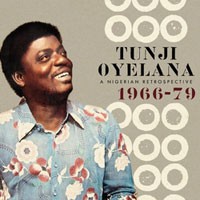Tunji Oyelana
A Nigerian Retrospective 1966-79

- Record Label
- Soundway
About this item
During the golden age of Nigerian music in the 1970s, as thousands of records were produced in a wide spectrum of styles and marketed to an immense audience of ardent consumers, very few people - including the producers of the music themselves - seriously entertained the possibility that any of these popular entertainments could be considered as art.
Enter the multifaceted artist Tunji Oyelana. Equal parts singer-songwriter, actor, bandleader, dramatist, comedian and academic, Oyelana elevated the realm of pop music by infusing it with the poetic storytelling of Yoruba folklore. Backed by his crack backing group, The Benders (named for their ability to traverse - and blend a variety of styles) Oyelana blended the fashionable sounds of highlife, afrobeat, afrorock, funk, calypso, juju and reggae and transformed them into something timeless and utterly unique.
Tunji’s first records came out in 1969 but it wasn’t until two years later that the first record credited to Tunji Oyelana & The Benders, ‘Agba Lo De’ b/w ‘Koriko Nde’, was released. The record turned out to be the smash that put the name Tunji Oyelana & The Benders on the national map. More significantly, the record’s unique sound - along with that of Fela Ransome-Kuti’s ‘Jeun K’oku’ (‘chop and quench’), which arrived mere weeks before it - signaled the emergence of a new era and a new genre in Nigerian music.
Oyelana himself attributes his life as a professional artist to meeting Wole Soyinka, one of the unimpeachable doyens of Nigerian arts. They met in 1960 at the age of twenty-one, commencing a partnership that endured for more than five decades. In 1983, Soyinka joined The Benders for the album Unlimited Liability Company, which proved to be wildly popular with audiences across the country but angered Nigeria’s civilian government with its satirical critique of political corruption. Years later, Soyinka and Oyelana would run afoul of military dictator Sani Abacha while touring internationally with Soyinka’s play The Beatification Of Area Boy in 1996 and find themselves charged with treason, forcing them into exile until Abacha’s death in 1998.
For Oyelana himself, the golden age continues as he lives with his family in London and continues to perform several nights a week at Emukay, the restaurant and cultural centre that he runs with his wife, which has become a mecca for fans eager for the privilege of beholding a living legend at work.
